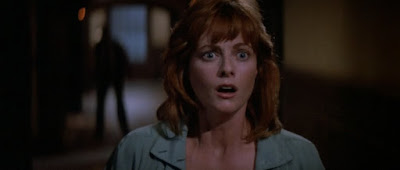On the way to the river the crew stop for petrol and to organise some local drivers to transport their cars to the other end of the canoe trip. The city folk make light of the ramshackle houses but one of them, softly strumming his guitar, attracts the attention of a boy with a banjo and together they kick up a storm of bluegrass which became a brick in the culture and remains a moment of cinema more famous than the film it's part of. When Drew the guitarist goes to shake the boy's hand the latter turns away with a strange suddenness. The vibe ain't warm. With the drivers sorted the party makes its way to the river and the guys set to and soon are soaring o'er the water in their canoes. At one point two of them get to the bank and are met by two locals and things get very ugly very quickly, turn violent and then messy, very, very messy. What was a holiday adventure is now a survival story.
John Boorman's career was established by 1972 with a swathe of tv credits and a few feature films including one of the oddest rock movies of the British Invasion (Catch Us if You Can). Point Blank was a spooky crime movie with leads taken form the likes of Antonioni and Nicholas Roeg. He would go on to the bizarre sci-fi of Zardoz, the watchable but overlong Excalibur and one of the more ridiculed sequels in history (Exorcist II The Heretic). Eclectic doesn't cover it. But early on in that string came this lean adventure in ethics which pitted civilisation against nature without a clear winner in mind.
This is pretty much the only time you will see Burt Reynolds this vulnerable. In his breakthrough role and before his trademark tache he looks every centimetre the action hero but as the scenes progress he's clearly only marginally more equipped than the others at what they are trying to do. He's just another city slicker. Jon Voigt was building his career with some early peaking highlights like Midnight Cowboy and as the unforgettable warzone capitalist Milo in Catch 22. Here he steps back and immerses himself in the film's most lengthy character arc from beige bloke to enforced action hero to bottled up citizen. Ned Beatty has yet to adopt his bellowing bluster in the authority figures he would progress to (like Network's astonishing single scene movie stealer as Mr Jensen) and gives us poignant depiction of post trauma. And then there's Ed Cox as Drew the moral centre, social conscience and dissenting voice whose dispatch is both elegant and eerie.
It's the casting of the locals that might cause the concern of the new viewer of the 2020s. These actors were found among the real locals of the location shoot but you could choose this type or that depending on what you wanted to create. Boorman's team chose the toothless, mumbling and disfigured, the suggestively inbred and savage. Deliverance deals its narrative in the spaces between the archetypes (Lewis' vulnerability, Bobby's courage etc.) and while the lokels are afforded some sympathy at the wrong end of the cheap quips of the city folk they present as arcane throwbacks. Are they like this because they are closer to the nature that the sophisticates are pretending to conquer? I don't get the idea that the film is telling us that this is what life in the woods does to you or that everyone who lives outside the city limits is a hawg-molestin' bad ol' boy, but I do get the intensity of the othering. Does a turn at Duelling Banjos fix that? No, but it doesn't promote it, either. I'll leave this one unresolved in the naive wish that those who watch it now will add the context of 1972 and allow the caricatures and distortions into the way of the world as it was. If you are new to the film you might consider this just as confronting as the atrocity at the heart of the conflict.
This essay in masculinity against and with nature remains a potent one and the lean touch in its execution educative. If we can accept the notion of the alienation as being part of the persuasion of the story we might see a clear way to adding some understanding to the art before our time and find even the difficult bits instructive. Personally, I think they add potency to Deliverance and from a director whose grandest epic statements could leave him awkwardly naked this one's minimalism impresses. Deliverance was a massive hit at the time and has come down to us without need of even the mild coddling I've supplied here. It's one of those instances, though, that gives us pause to wonder at its great success. I dont' mean it's a bad film (it's a great one) I mean it's hard to know why millions love it.







